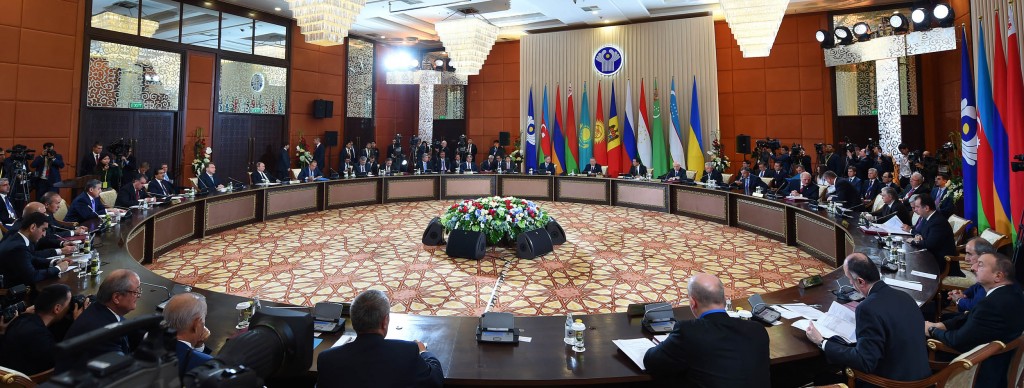BURABAI – President of Kazakhstan Nursultan Nazarbayev chaired a meeting of the Heads of State Council of the Commonwealth of Independent States (CIS) in Burabai, Kazakhstan, on Oct. 16, which focused intensively on security challenges such as terrorism.
Seven foreign heads of state flew to Kazakhstan to attend the meeting: President of Armenia Serzh Sargsyan, President of Azerbaijan Ilham Aliyev, President of Belarus Alexander Lukashenko, President of Kyrgyzstan Almazbek Atambayev, President of Russia Vladimir Putin, President of Tajikistan Emomali Rakhmon and President of Uzbekistan Islam Karimov. Deputy Minister of Foreign Affairs and European Integration of Moldova Andrei Galbur and Deputy Chairman of the Cabinet of Ministers of Turkmenistan Satlyk Satlykov represented their countries, while Ukraine sent a charge d’affaires from its Astana embassy.
Opening the meeting, the President of Kazakhstan congratulated Lukashenko on his victory in Belarus’s recent presidential elections, as well as Atambayev on the successful holding of parliamentary elections in Kyrgyzstan. Nazarbayev noted that Kazakhstan, since the founding of the CIS, has consistently advocated for increasing multilateral cooperation among the countries and deep integration in key areas of cooperation.
“The CIS is a unique platform bringing together 11 post-Soviet states. In such meetings, we can openly share our views on the most pressing issues of international politics and discuss any questions of our multilateral cooperation. I am confident that today’s event will contribute significantly to the development of the CIS,” said Nazarbayev in the beginning of half day of talks.
Lukashenko began by awarding Nazarbayev the Order of Friendship of Peoples of Belarus, saying that “the Kazakh President implements his wealth of experience and makes a contribution to the strengthening of cooperation between our countries.”
The agenda of the CIS summit included 17 issues. The heads of state adopted joint statements to mark the 70th anniversary of the United Nations, the 30th anniversary of the Chernobyl accident and a joint statement on combatting international terrorism. Nazarbayev repeated his proposal to create an international network under the auspices of the UN in order to combat terrorism effectively.
The CIS heads of state also adopted a CIS cooperation programme in strengthening border security for 2016–2020. The programme envisages a wide range of measures aimed at improving protection of the CIS external borders, coordinating activity of border agencies and improving the legal framework.
Important decisions were taken to strengthen humanitarian cooperation, including the legal framework of migration processes in the CIS and the implementation of the interstate programme CIS Capitals of Culture. Turkmenistan’s Dashoguz was announced the CIS Capital of Culture for 2016.
“The signed documents have a great practical value, and their adoption will contribute to deepening the cooperation between our countries,” said the Kazakh President upon conclusion.
In December 1991, the leaders of 11 former Soviet republics – Armenia, Azerbaijan, Belarus, Kazakhstan, Kyrgyzstan, Moldova, Russia, Tajikistan, Turkmenistan, Ukraine and Uzbekistan – signed the Alma-Ata Protocol establishing the CIS. Georgia joined two years later, in December 1993; in 2009, Georgia withdrew from the CIS.
The CIS has coordinating powers in the realm of trade, finance, lawmaking and security. Eight of the CIS member states participate in the CIS Free Trade Area, and five of these form the Eurasian Economic Union. In addition, six member states participate in the Collective Security Treaty Organisation.


